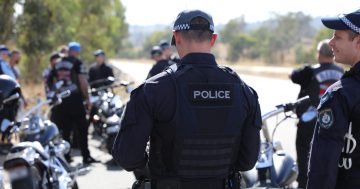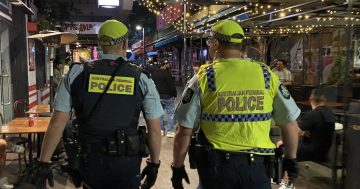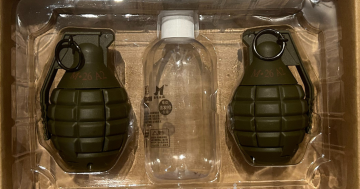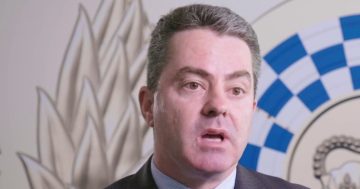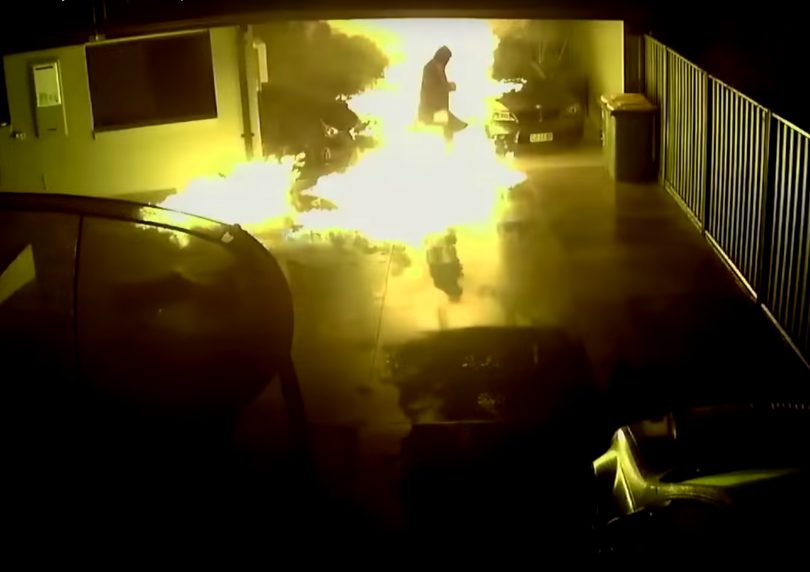
Shocking CCTV footage released recently shows a bikie shooting and arson attack at a Calwell home earlier this year. This is a screen grab of the footage, which was supplied by ACT Policing.
The four outlaw motorcycle gangs operating in Canberra are making a mockery of the ACT Government and putting the lives of Canberrans in ‘incredible danger’, according to the president of the Australian Federal Police Association, Angela Smith.
On the back of shocking footage released recently of a bikie shooting and arson attack at a Calwell home in June (shown below), the association has renewed its calls for anti-consorting laws in the ACT, saying there will be more shootings unless the laws are introduced.
“The footage of the bikies we saw last week in Calwell is yet another frightening reminder that it’s only a matter of time before an innocent member of our community is hurt or killed by this turf war,” Ms Smith said.
Police seek to identify offenders of attempted murder in Calwell
ACT Policing has released CCTV footage of a bikie shooting and arson attack at a Calwell home earlier this year and is asking the Canberra public for their assistance to help identify the offenders.Around 10:45 pm (June 28), four men entered the backyard of a house on Carter Crescent, Calwell and set fire to three vehicles and discharged a number of firearms into the house.Police are urging anyone who may have any information that could assist police to contact Crime Stoppers on 1800 333 000, or via the Crime Stoppers ACT website.Read the full story here: http://ow.ly/G2Dn30lIId3
Posted by Breaking247 on Thursday, September 6, 2018
“The ACT government must act now and back up police by introducing laws to tackle this violent bikie menace.
“The Adler shotgun is an incredibly dangerous and powerful weapon, especially in the wrong hands.
“This won’t be the last shooting here in Canberra unless anti-consorting laws are introduced. This legislation only applies to people with criminal convictions.”
Ms Smith said there has been an influx of bikies into the ACT since tough anti-consorting laws have come into force in Queensland, NSW, Victoria and South Australia.
“NSW is getting tougher on outlaw bikie gangs by giving police additional police to target and disrupt their violent activities. It’s a stark contrast to the weak bikie laws we have here in the ACT, where gangs are free to roam and incite violence in our community,” Ms Smith said.

Members of the Nomads gang gather on Mount Ainslie late last month. This photo was posted on the Instagram account of life member ‘Moudi’ Tajjour.
“It has been confirmed by ACT Policing that the ACT has four outlaw motorcycle gangs operating in Canberra: the Finks, Rebels, Comancheros and Nomads.
“These gangs are making a mockery of this government. And while the government stubbornly refuses to enact these laws it is putting the lives of Canberrans in incredible danger.”
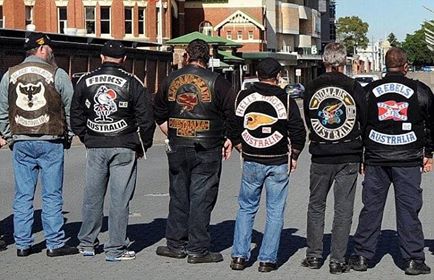
Social media is alive with bikie photos in Canberra. This photo in the ACT was posted by ‘Raider of the storm’ on Instagram on April 3 this year with hashtags including ‘hellandangels’, ‘rebels’, ‘vagos’, ‘finks’ and ‘nomads’.
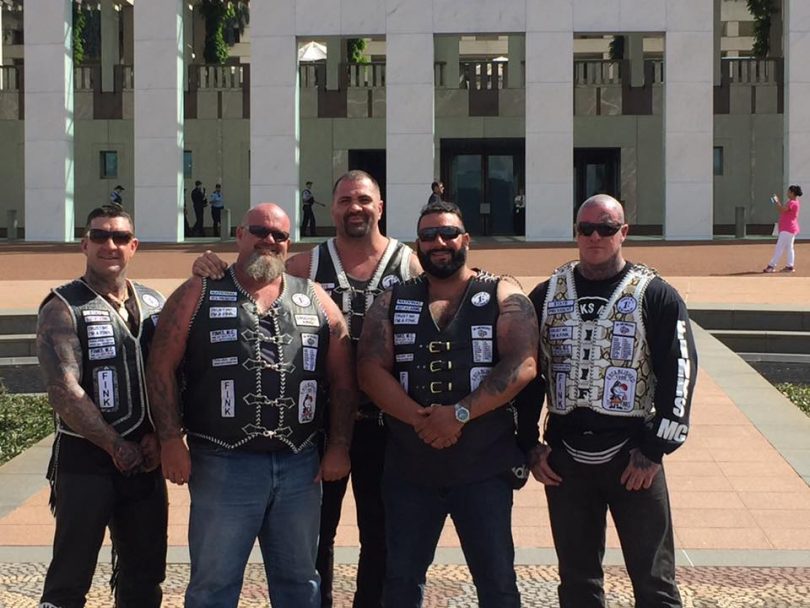
A ‘Finks Mc Canberra run ‘ Facebook photo from March 29 last year.
Ms Smith said that the point of anti-consorting laws is to disrupt and break apart the gangs and their criminal activities.
“These laws make it difficult to function and force bikies to do their business outside of the ACT. We don’t want these gangs in our community.
“The ACT government has responded to further calls for anti-consorting laws by saying they are not going to simply follow suit with NSW,” Ms Smith said.
“The AFPA is not asking the ACT government to simply follow NSW. We are asking for laws to prevent gangs from congregating in our city.
“The ACT Government is dragging its feet and the community will pay the price.”
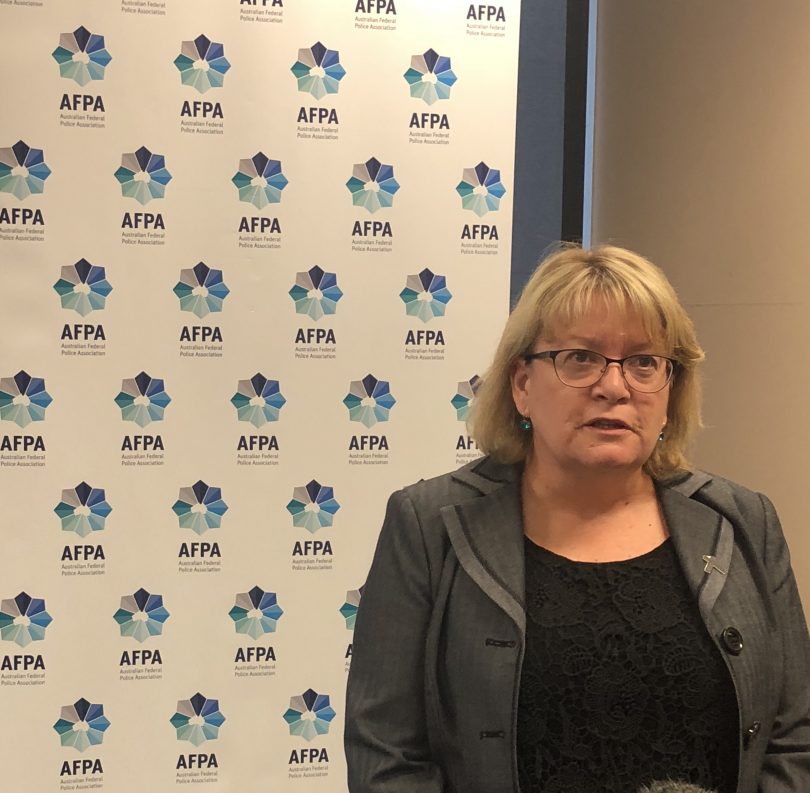
AFPA president Angela Smith.
The Canberra Liberals have also renewed their calls for anti-consorting laws, which Opposition legal spokesman Jeremy Hanson said they have been calling for over the past nine years.
Last year, the Labor Party and the Greens voted down Mr Hanson’s Bill, to introduce anti-consorting laws and criminal control measures to stamp out Canberra’s bikie gang wars. The laws were drafted in consultation with the Human Rights Commissioner to allay concerns that other groups could be targeted.
“We strongly believe and the evidence is very clear that without anti-consorting laws we will continue to see a continuation of this bikie war which is raging through our suburbs,” Mr Hanson said today.
“The failure of the Greens and the Labor Party to introduce these laws is a disgrace and it will eventually lead to someone getting killed or seriously injured.”
A spokesperson for ACT Policing said they have had conversations with the Government regarding anti-consorting laws but the Government has indicated these are “off the table”.
“ACT Policing supports and encourages nationally consistent legislation – to deal with what is a national issue,” the spokesperson said.
“In regard to anti-consorting laws, those are tools that other jurisdictions have explored and implemented with some effect.
“Preventative powers should not be seen as a silver bullet, but we will continue discussions with Government to explore preventative powers which are proportionate and meet the community’s expectations.
“Further questions regarding anti-consorting laws are a matter for Government.”
A spokesperson for the ACT Government said that the government is not considering introducing anti-consorting laws.
“Even in jurisdictions where anti-consorting and other legislation is already in place, criminal gangs remain a problem,” the spokesperson said.
“The NSW Ombudsman’s report on anti-consorting found that it disproportionately affected vulnerable groups, including Aboriginal and Torres Strait Islanders and children and young people, and there was no evidence to establish a measurable crime prevention benefit.
“The ACT Government is committed to introducing laws, and investing resources in methods, that are proven to combat crime and deprive gangs of the financial incentives that motivate their illegal activities.”
The Government spokesperson said that during its current term in office, the Government had invested millions of dollars into ACT Policing’s Taskforce Nemesis, which has to date charged more than 260 people, laid more than 740 charges and executed over 200 search warrants.
The spokesperson said that during the current term, the Government had also:
- strengthened police powers to set up a crime scene and preserve evidence
- provided funding to the Director of Public Prosecutions to seize criminal assets
- introduced laws to prevent gangs from putting in fortifications that could be used to hinder a lawful search by police.













